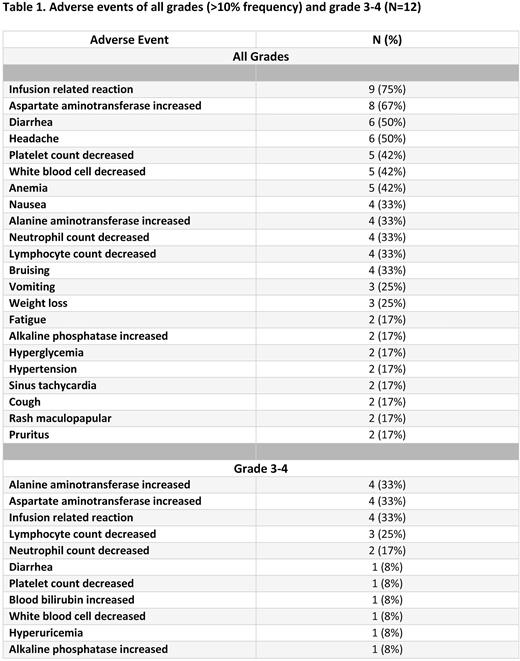Abstract
Background. Chemo-immunotherapy followed by autologous stem cell transplant remains the standard approach in treatment of patients with newly diagnosed MCL but is not curative. Furthermore, the majority of patients are poor candidates for this approach due to age, comorbidities, or high genetic risk. Bruton tyrosine kinase inhibitors have high efficacy and are well tolerated in relapsed MCL, and have already been successfully used in frontline therapy. Here we report initial results of a phase 2 study of AU2 in patients with previously untreated MCL (NCT04783415).
Methods. This ongoing open-label phase 2 investigator-sponsored study enrolled patients with previously untreated MCL, aged ≥65 years, those unwilling to undergo intensive induction, and/or patients with high-risk genetics (TP53 aberrations, complex karyotype [CK]). Acalabrutinib was given at 100 mg po twice daily, umbralisib 800 mg po daily (amended to days 1-14 of cycle 1 and days 1-7 of subsequent cycles) starting with cycle 1 day 1; ublituximab 900 mg intravenously on days 1, 8, 15 of cycle 1 and day 1 of subsequent cycles. Each cycle was 28 days. After 6 cycles, patients continued maintenance with oral agents and ublituximab every 2 cycles (planned for 24 cycles). The primary study objective was efficacy (compete response rate) by Lugano criteria; secondary objective was safety. The study was suspended to enrollment by the FDA in February 2022 due to general safety concerns with umbralisib and other PI3K inhibitors.
Results. Twelve patients were enrolled. Median age was 70 (55-79) years, 9/12 (75%) were male; all had an ECOG performance status 0-1. 6/12 patients had a TP53 aberration, and one additional patient had CK. The first two patients enrolled on study developed grade 3 and 4 AST/ALT elevation by mid-cycle 2. As a result, the trial was amended to administer umbralisib on days 1-14 of cycle 1 and days 1-7 of subsequent cycles. In total, four patients were unable to tolerate acalabrutinib due to recurrent AST/ALT abnormalities and continued on U2 therapy alone. The remaining eight patients tolerated all three drugs. All 12 patients achieved complete response (ORR 100%, CR 100%). At this time, 10/12 patients remain on therapy. One patient discontinued after 9 cycles (for progressive disease), and another patient discontinued after 4 cycles due to an adverse event (HSV encephalitis). The 10 patients still on treatment have received a median 12.5 (range 6-16) cycles. The most common treatment-related adverse events (AEs, any grade) were infusion-related reactions (Table 1); the most common grade 3+ AEs were ALT/AST elevation and infusion-related reaction.
Discussion. Thus, AU2 is a highly effective regimen in patients with previously untreated MCL, including those with high-risk genetics (100% CR rate). While a combination of continuous umbralisib and acalabrutinib was associated with liver function test abnormalities, intermittent dosing of umbralisib was well tolerated.
Disclosures
Danilov:Nurix: Consultancy, Research Funding; MEI: Consultancy, Research Funding; Morphosys: Consultancy; Incyte: Consultancy; Astra Zeneca: Consultancy, Research Funding; Takeda Oncology: Research Funding; Bayer Oncology: Research Funding; Beigene: Consultancy; Cyclacel: Research Funding; Genentech: Consultancy; GSK: Consultancy; Abbvie: Consultancy, Research Funding; Pharmacyclics: Consultancy; Bristol-Meyers-Squibb: Consultancy, Research Funding. Sportelli:TG Therapeutics: Current Employment. Miskin:TG Therapeutics: Current Employment. Shouse:Beigene Inc USA: Honoraria; Kite Pharma: Speakers Bureau.
OffLabel Disclosure:
umbralisib, ublituximab, acalabrutinib in previously untreated mantle cell lymphoma
Author notes
Asterisk with author names denotes non-ASH members.


This feature is available to Subscribers Only
Sign In or Create an Account Close Modal